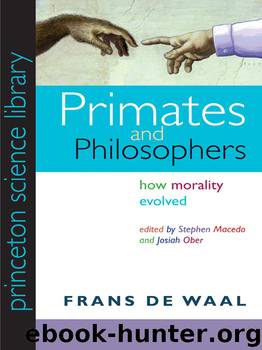Primates and Philosophers_How Morality Evolved by Frans de Waal

Author:Frans de Waal [Waal, Frans de]
Language: eng
Format: epub
ISBN: 978-1-4008-3033-6
Publisher: Princeton University Press
Published: 2006-08-15T04:00:00+00:00
In an essay called “Conjectures on the Beginnings of Human History,” Kant speculated that the form of self-consciousness that underlies our autonomy may also play a role in the explanation of some of the other distinctively human attributes—including culture, romantic love, and the capacity to act from self-interest. Other philosophers have noticed the connection of self-consciousness of this sort with the capacity for language. I can’t go into those arguments here, but if they are correct they would provide evidence that only human beings have this form of self-consciousness.17
If that is right, then the capacity for normative self-government and the deeper level of intentional control that goes with it is probably unique to human beings. And it is in the proper use of this capacity—the ability to form and act on judgments of what we ought to do—that the essence of morality lies, not in altruism or the pursuit of the greater good. So I do not agree with de Waal when he says, “Instead of merely ameliorating relations around us, as apes do, we have explicit teachings about the value of the community and the precedence it takes, or ought to take, over individual interests. Humans go much further in all of this than the apes, which is why we have moral systems and apes do not” (p. 54). The difference here is not a mere matter of degree.
And it isn’t a small difference, that ability to be motivated by an ought. It does represent what de Waal calls a saltatory change. A form of life governed by principles and values is a very different thing from a form of life governed by instinct, desire, and emotion—even a very intelligent and sociable form of life governed by instinct, desire, and emotion. Kant’s story about the man deciding to face death rather than bear false witness is the stuff of high moral drama, but it has its constant analog in our everyday lives. We have ideas about what we ought to do and to be like and we are constantly trying to live up to them. Apes do not live in that way. We struggle to be honest and courteous and responsible and brave in circumstances where it is difficult. Even if apes are sometimes courteous, responsible, and brave, it is not because they think they should be. Even as primitive a phenomenon as a teenager’s efforts to be “cool” is a manifestation of the human tendency to live a life guided by ideals rather than merely driven by impulses and desires. We also suffer deeply from our self-evaluations and act in sick and evil ways as a result. This is part of what I had in mind earlier when I said that human beings seem psychologically damaged in a way that suggests a break with nature. But none of this is a way of saying that morality is a thin veneer on our animal nature. It’s the exact contrary: the distinctive character of human action gives us a whole different way of being in the world.
Download
This site does not store any files on its server. We only index and link to content provided by other sites. Please contact the content providers to delete copyright contents if any and email us, we'll remove relevant links or contents immediately.
Sapiens: A Brief History of Humankind by Yuval Noah Harari(14389)
Sapiens by Yuval Noah Harari(5372)
Pale Blue Dot by Carl Sagan(5009)
Homo Deus: A Brief History of Tomorrow by Yuval Noah Harari(4918)
Livewired by David Eagleman(3775)
Origin Story: A Big History of Everything by David Christian(3692)
Brief Answers to the Big Questions by Stephen Hawking(3435)
Inferior by Angela Saini(3316)
Origin Story by David Christian(3202)
Signature in the Cell: DNA and the Evidence for Intelligent Design by Stephen C. Meyer(3138)
The Gene: An Intimate History by Siddhartha Mukherjee(3098)
The Evolution of Beauty by Richard O. Prum(2997)
Aliens by Jim Al-Khalili(2830)
How The Mind Works by Steven Pinker(2816)
A Short History of Nearly Everything by Bryson Bill(2698)
Sex at Dawn: The Prehistoric Origins of Modern Sexuality by Ryan Christopher(2529)
From Bacteria to Bach and Back by Daniel C. Dennett(2485)
Endless Forms Most Beautiful by Sean B. Carroll(2483)
Who We Are and How We Got Here by David Reich(2437)
